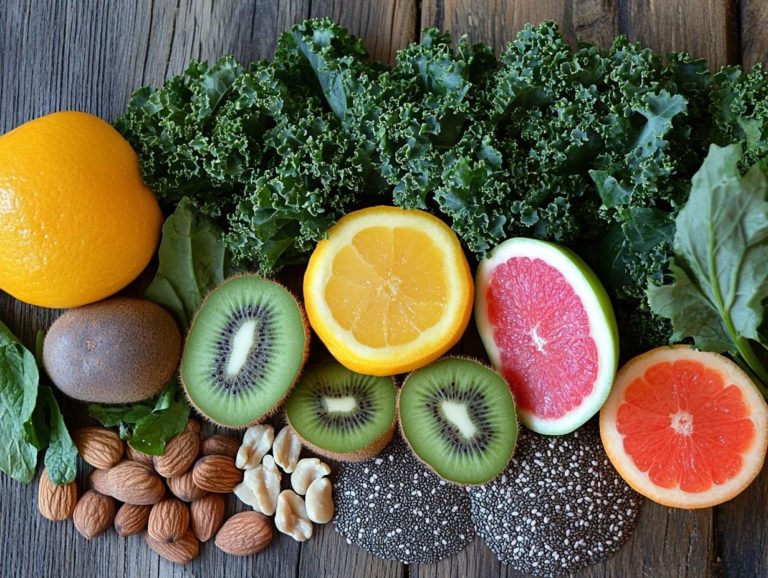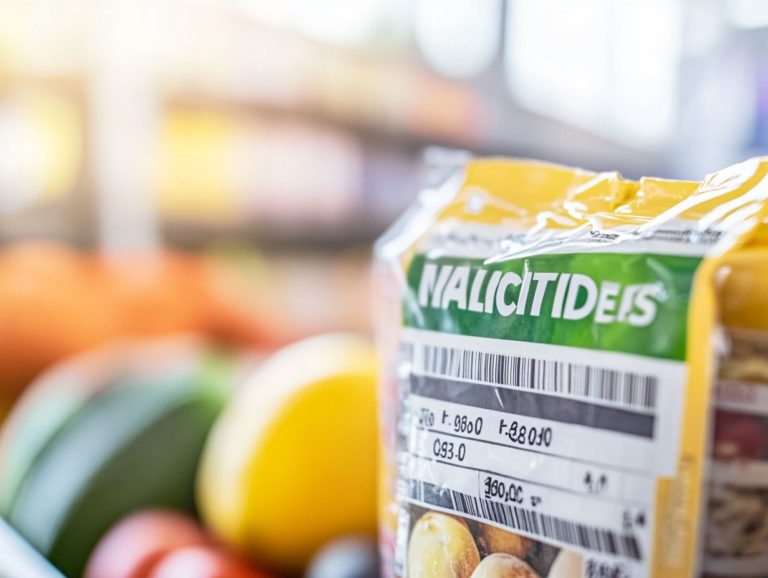The Truth About Artificial Sweeteners
Artificial sweeteners have undoubtedly carved out a prominent place in contemporary diets. They present a sugar-free option for those eager to indulge their sweet cravings without the extra calories.
But what exactly are these sugar substitutes, and how do they vary from one to another? As you explore the benefits and risks associated with artificial sweeteners, you may uncover some health concerns that could catch you off guard.
Expert opinions on the safety of artificial sweeteners provide valuable insights. You ll also discover some enticing natural alternatives.
Embark on this journey as you unravel the truth about artificial sweeteners and their effects on your health.
Contents
Key Takeaways:
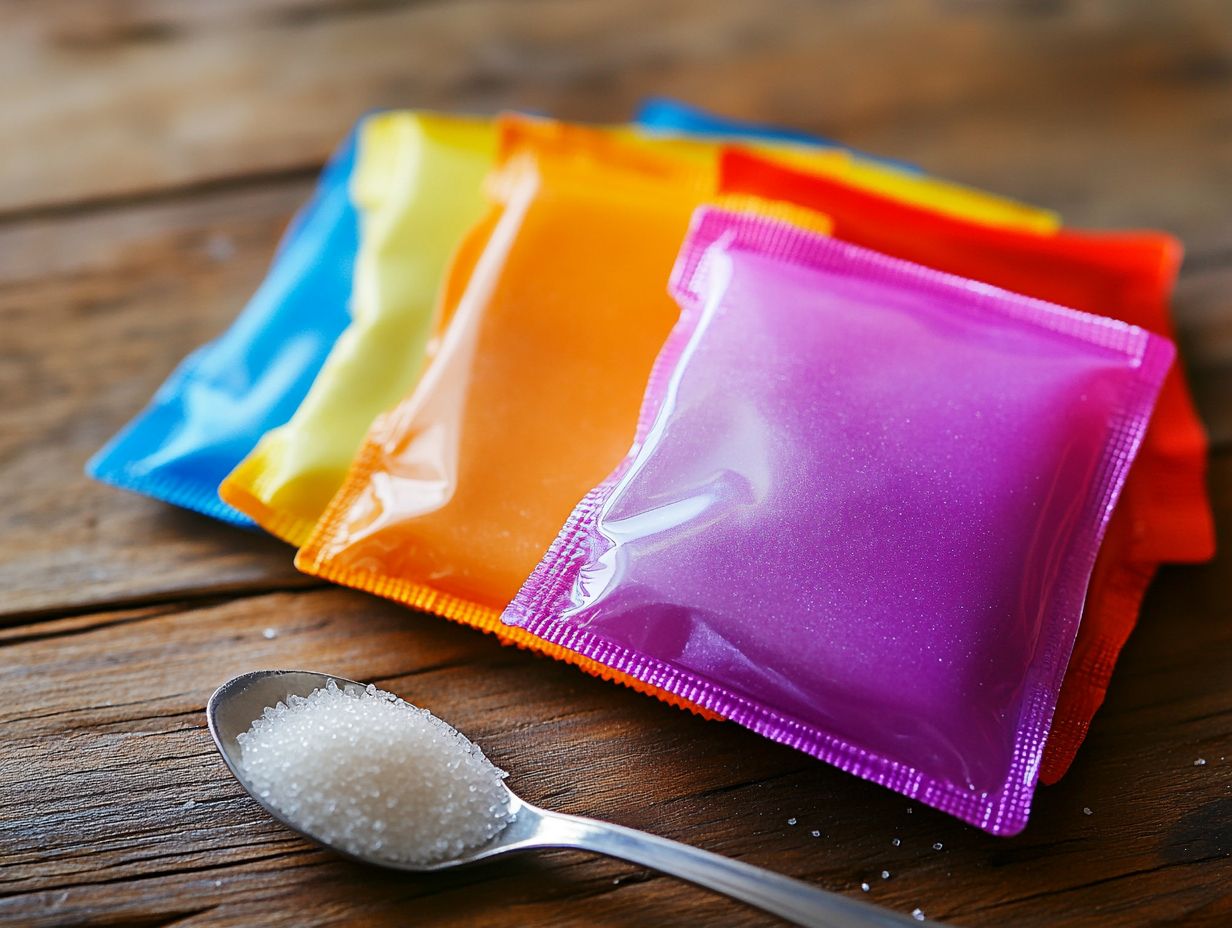
- Artificial sweeteners are sugar substitutes that are low in calories and commonly used in many food and beverage products.
- They can help with weight management and blood sugar control but may also pose risks such as adverse effects on gut health and increased sugar cravings.
- Research on their safety remains inconclusive; some experts say they are safe in moderation, while others caution against their use.
- Natural sweeteners like honey and stevia can be healthier alternatives.
What are Artificial Sweeteners?
Artificial sweeteners are your low-calorie allies. They are expertly crafted to add sweetness to food without the hefty calorie count that typically tags along.
These sugar substitutes think familiar names like aspartame, sucralose, and saccharin often find their way into various food products as additives. They deliver sweetness while dramatically cutting calorie intake.
They re perfect for anyone looking to manage their weight or reduce sugar consumption. This is especially true for those navigating health concerns like diabetes or obesity.
The conversation about their long-term health effects remains a hot topic. Organizations like the FDA continuously assess their acceptable daily intake.
Definition and Types
Artificial sweeteners, often called low-calorie sweeteners or sugar substitutes, are synthetic compounds designed to add sweetness to food and beverages without the extra calories that traditional sugar brings.
You might encounter common types such as aspartame, sucralose, and saccharin, along with sugar alcohols like erythritol, xylitol, and sorbitol. Each varies in sweetness and caloric content, providing you with a range of options.
These sweeteners are generally categorized as non-nutritive, meaning they don’t provide significant calories compared to regular sugar. For example, aspartame is about 200 times sweeter than table sugar, while sucralose can reach up to 600 times that level of sweetness.
This allows manufacturers to use much smaller quantities to achieve the sweetness you desire in their products. Whether derived from natural sources or synthesized in labs, these alternatives are prevalent in a variety of foods, from diet sodas to sugar-free desserts.
Understanding how they are used in food processing enables you to make informed choices about your dietary needs.
Pros and Cons of Artificial Sweeteners
Artificial sweeteners present a complex array of advantages and disadvantages to consider as you integrate them into your diet. This is especially important regarding weight management and sugar consumption.
The main benefits lie in their ability to help reduce calorie intake. This makes them valuable tools for those striving to meet dietary goals whether for weight loss, diabetes control, or minimizing added sugars.
However, it’s essential to remain mindful of the potential risks associated with their use. Concerns include long-term health implications and possible connections to various health issues.
Join us as we dive deeper into the world of sweeteners and find the best options for your health!
Benefits and Risks
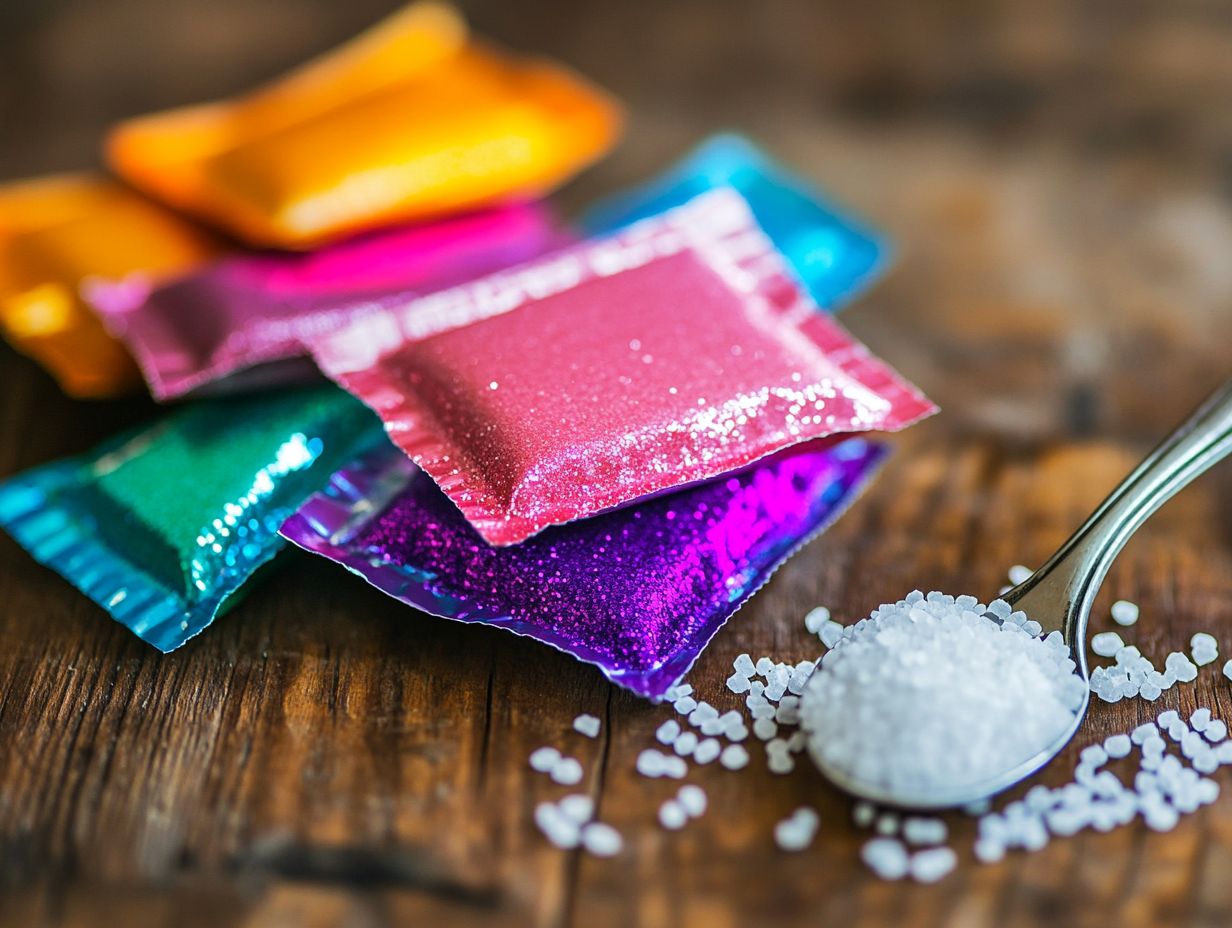
Artificial sweeteners help with weight management. They are effective sugar substitutes for those who want to cut back on sugar.
However, it’s crucial to weigh these advantages against potential health risks, such as tooth decay and the ongoing debate about their long-term health effects.
By choosing these low-calorie sweeteners, you can enjoy the sweetness you desire without the significant caloric burden that natural sugars impose. This makes them an appealing option for anyone managing their weight.
These substitutes may also lower the risk of blood sugar spikes, which can be particularly beneficial for diabetics. However, recent findings from health agencies have raised concerns about their contribution to tooth decay, prompting questions about whether the long-term benefits truly outweigh the potential risks.
Many are concerned about a link between regular use of artificial sweeteners and metabolic issues. We need to take a closer look at how these sweeteners affect our health over time.
Health Concerns Related to Artificial Sweeteners
Health concerns surrounding artificial sweeteners have become a prominent topic among consumers, healthcare professionals, and researchers. These concerns often relate to serious conditions such as cancer, diabetes, and heart disease.
It s also important to consider specific health conditions, like phenylketonuria (PKU), a rare genetic disorder affecting how the body processes phenylalanine, when evaluating their use. Certain sweeteners can pose risks for individuals with this metabolic disorder.
Possible Negative Effects on Health
The potential negative effects of artificial sweeteners have been the focus of extensive research. Numerous studies suggest links to various health risks, such as cancer, diabetes, and heart disease.
While short-term trials may indicate limited adverse effects, long-term studies are crucial for understanding the implications of regular consumption.
These findings have ignited considerable debate among health professionals. Some experts contend that occasional use of these substitutes is safe, while others express concerns about their potential to disrupt metabolic processes and gut microbiota.
What seems harmless in the short term could lead to serious health issues down the line. Health agencies struggle to present a clear consensus; some endorse specific artificial sweeteners, while others advise caution, leaving you uncertain about the actual risks of their everyday use.
Are Artificial Sweeteners Safe?
The safety of artificial sweeteners is a topic that sparks considerable debate, with a range of expert opinions and research findings fueling the discussion.
Government health agencies, including the FDA, have set acceptable daily intake levels for these sweeteners, declaring them safe for most individuals when consumed within those limits.
However, it’s crucial to understand their long-term effects on our health now, before it’s too late.
Expert Opinions and Research Findings
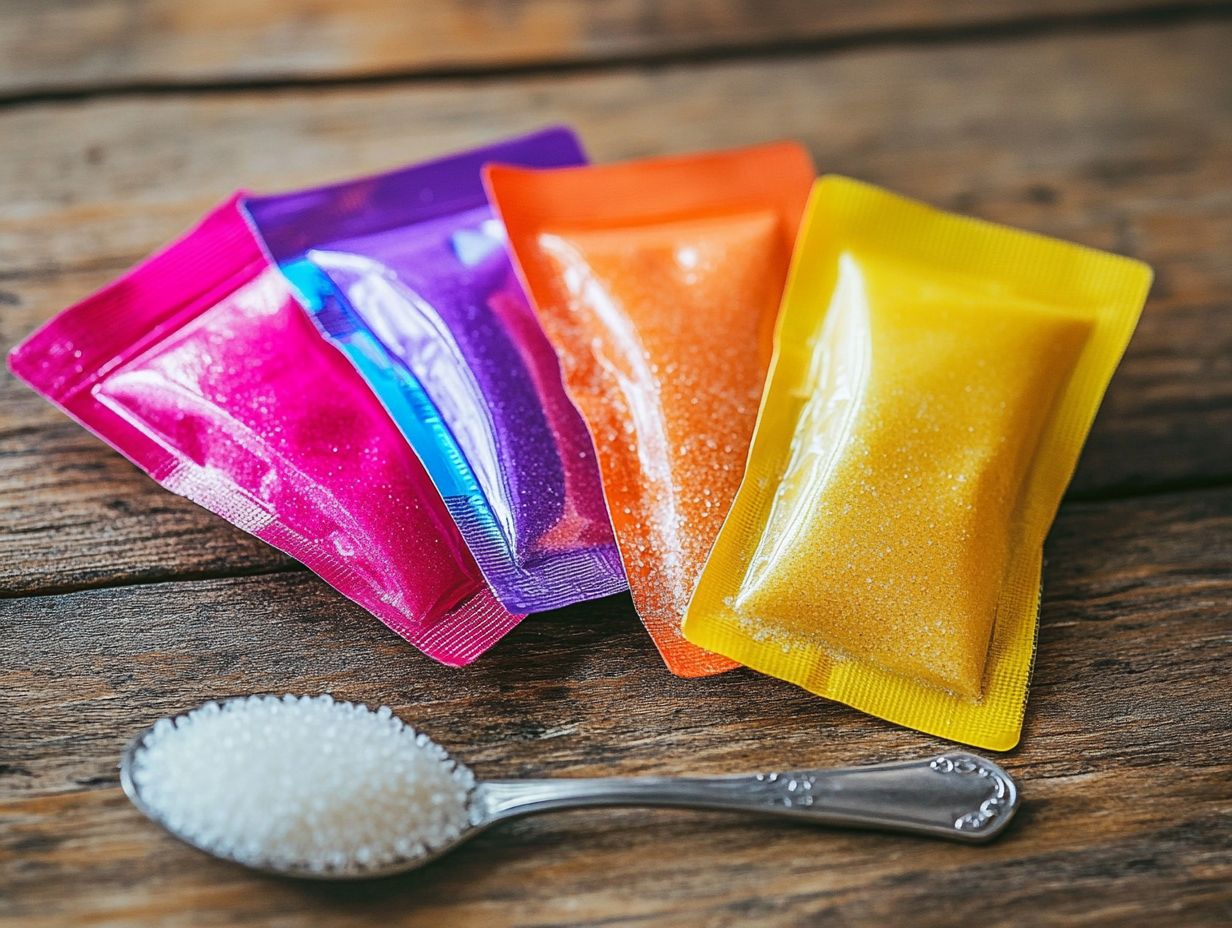
Expert opinions and research findings about artificial sweeteners present a mixed bag. On one hand, you ll find experts championing their benefits in reducing sugar intake; on the other, some raise red flags about potential health risks.
The FDA bases its position on extensive research, yet the ongoing debate highlights the complexities surrounding their safety. Many nutritionists argue that these sugar alternatives can be vital for managing weight and controlling diabetes, especially for those looking to cut their caloric intake.
However, some health organizations advise caution regarding long-term consumption. They reference studies linking certain artificial sweeteners to metabolic syndrome, changes in the gut microbiome, and an increased likelihood of craving sweeter foods.
This dichotomy raises larger questions about food safety, as researchers delve into the health implications of these commonly used additives. It can leave you feeling a bit bewildered about what choices might truly be the healthiest.
If you have concerns about artificial sweeteners or your health, consider consulting a healthcare professional for personalized advice.
Alternatives to Artificial Sweeteners
Are you looking for healthier alternatives to artificial sweeteners? Explore a variety of natural sweeteners and sugar alcohols that offer health benefits without the downsides.
Consider options like:
- Stevia
- Monk fruit
- Erythritol
- Xylitol
Each of these sweeteners has a unique flavor and sweetness level, helping you cut calories without sacrificing taste.
Natural and Healthier Options
Natural sweeteners like stevia and monk fruit provide healthier choices for reducing sugar without losing sweetness. Sugar alcohols, such as erythritol and xylitol, also satisfy your sweet tooth while keeping calories low.
These options usually have fewer calories and a lower glycemic index than artificial sweeteners. They re especially beneficial for managing blood sugar or weight loss.
By adding natural sweeteners to your meals, you can enjoy diverse flavors without the digestive issues or long-term health concerns linked to synthetic options.
However, be mindful; consuming too much may cause digestive discomfort for some. It’s essential to understand different sweeteners’ characteristics for informed choices that fit your lifestyle.
Frequently Asked Questions
What are artificial sweeteners?
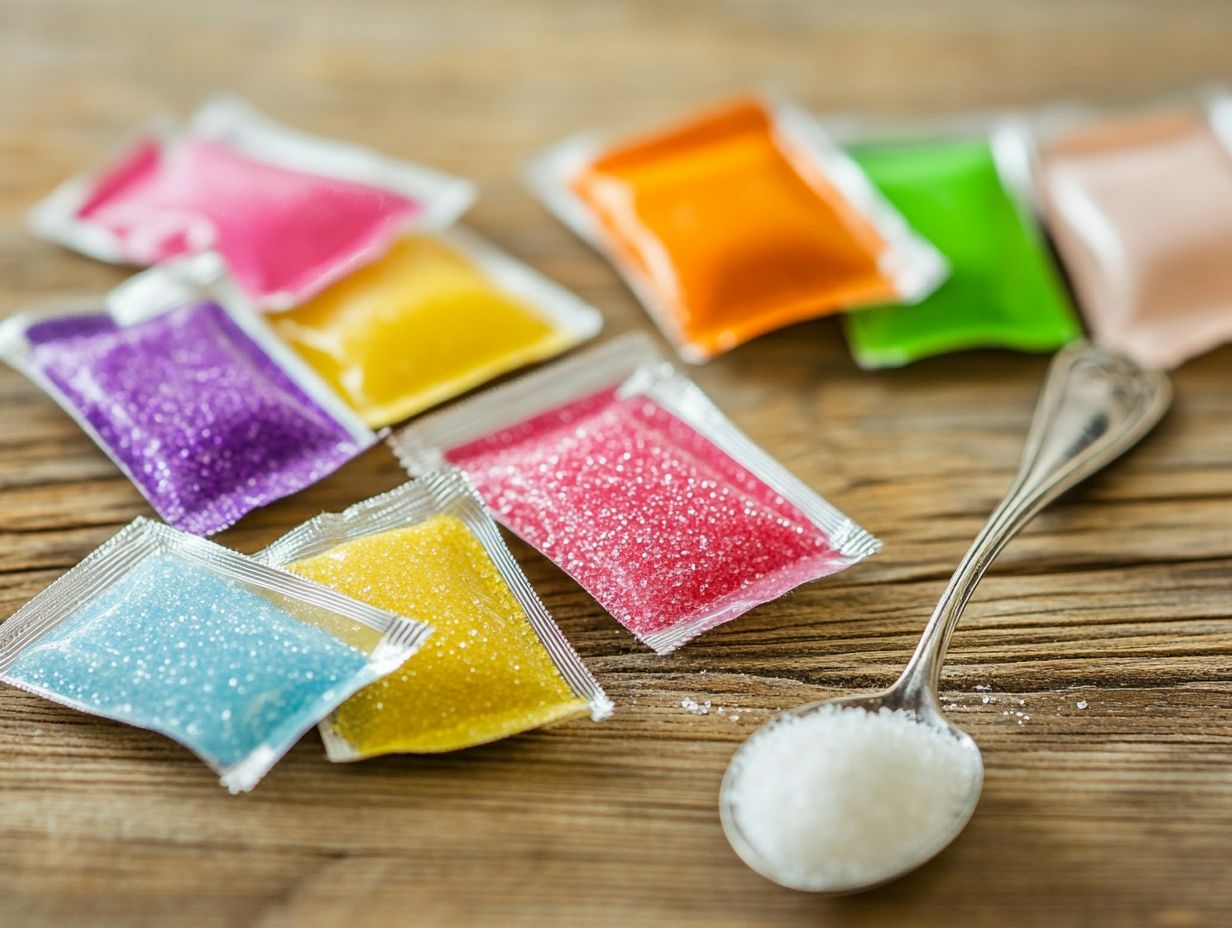
Artificial sweeteners are chemicals used to sweeten foods and drinks instead of natural sugar. They are low in calories, often called non-nutritive sweeteners.
Are artificial sweeteners safe for consumption?
Yes, the FDA has approved artificial sweeteners as safe. Moderation is key, as too much can have negative health effects.
Do artificial sweeteners cause weight gain?
Research shows no evidence that artificial sweeteners lead to weight gain. They can help reduce calorie intake and assist in weight management.
Can individuals with diabetes use artificial sweeteners?
Yes, they are safe for people with diabetes as they don t increase blood sugar levels. Always consult a healthcare provider before changing your diet.
Do artificial sweeteners offer health benefits?
While they have no nutritional benefits, they can help manage weight and sugar intake. They are useful for individuals with diabetes.
What are some common artificial sweeteners?
Common artificial sweeteners include sucralose, aspartame, saccharin, and stevia. You ll find them in diet sodas, sugar-free products, and low-calorie snacks.



